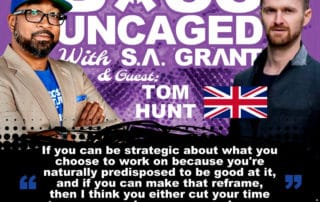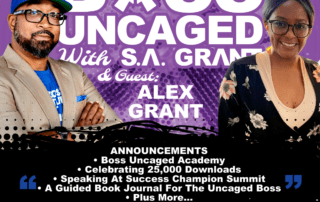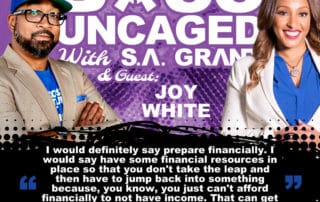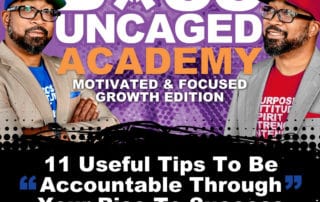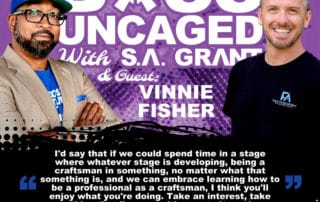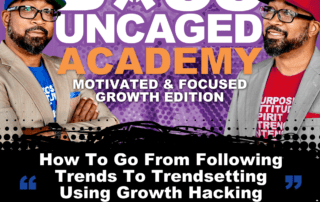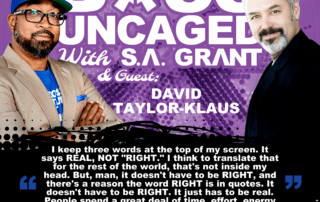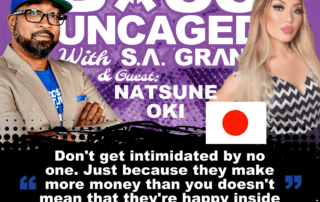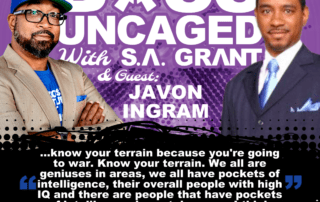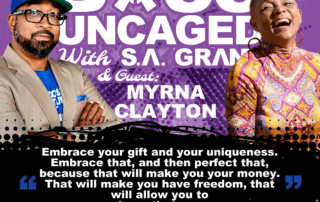Founder Of bCast: Tom Hunt AKA The Serial Boss – S2E34 (#62)
Boss Uncaged Podcast Overview
• Boss Uncaged Academy: Is Open For NEW Badass Students
WHAT IS BOSS UNCAGED ACADEMY?
The Boss Uncaged Academy is an online membership community and learning platform for you to get better results by giving you Actionable Growth Strategies in Business Building, Branding, Marketing, Mindset, and Lead Generation.
For more information click the link below
https://promo.bossuncaged.com/bua-earlybird-launch
THANK YOU FOR LISTENING!
Just speak to your Alexa-enabled device and say, ”Alexa Open Boss Uncaged.”
Also available on Apple Podcast, Spotify, iHeart Radio, Amazon, Google podcast, and many other popular podcasts apps.
- Follow S.A. GRANT on IG: @sagrant360
- Are we Facebook friends yet? Check out facebook.com/SAGrant360 for the latest Boss Uncaged updates.
- Looking for the latest books by S.A. Grant? Visit sagrant.com/books
- Also join The Boss Uncaged Book Club, It’s a book club for entrepreneurs. bookclub.bossuncaged.com
- Dress like a BOSS!! Visit store.bossuncaged.com to grab the latest in Boss Uncage Gear & Accessories!
Because we want to hear from you and would love your feedback, leave us a message 762.233.BOSS
#SAGrant #Quote #BossUncaged #Business #founder #podcasting #podcasts #podcastjunkie #podcastlife #podcastsofinstagram #podcastlove #podcastenespañol #podcastnetwork #podcast #podcastmovement #podcastcommunity #podcasters #podcastshow #podcastinglife #podcast🎧 #podcastseries #podcastaddict #podcastersofinstagram #podcaster #podcasthost #applepodcast #blackpodcasts #applepodcasts #radio #spotifypodcast #marketing #marketingdigital #digitalmarketing #socialmediamarketing #networkmarketing #marketingtips #marketingstrategy #marketingonline #marketingagency #marketing101 #marketingplan #marketingideas
Boss Uncaged Podcast Transcript
S2E34 – Tom Hunt.m4a – powered by Happy Scribe
Record here. All right, we are like three to one. Welcome welcome back to Boss Uncaged podcast. Today’s guests, I would give them like my guests nicknames and I would nickname him the serial boss. And as this episode starts to unfold, you know exactly why I’m calling him the serial boss. So without giving out all his his his accolades, why don’t you go ahead and give us a small introduction to who you are?
Thank you for the intro. I also love the background behind you, t Moc star just tried and failed at times, and finally, it seems like stuff is finally going well.
So I want my audience to understand, first of all, he’s modest as hell, right? I mean, let’s just talk about some of his his accolades a little bit. You’ve done a TED talk, right? You’ve been on Dragons Den. So keep in mind, he’s over in London. So those that don’t know what Dragons Den in is the originator of Shark Tank. Shark Tank came from from Dragons Den. Right. In addition to that, you’ve created and sold five companies in this span of time.
And one of the companies is, is how you and I got connected. So people that don’t know, like my current podcast is hosted on B-cast and we’re speaking to the founder of B-cast. So now that we kind of got the formalities out of the way, right. Like how would you define yourself in three to five words?
Online entrepreneur, slash marketer.
Definitely interesting. So let’s just talk about I mean, obviously there’s just multiple different facets to your to your journey. Right. And I think on Dragons Den, you were kind of like the male version of Spanx. You were kind of doing like male leggings that not correct.
That they’re 100 percent correct.
So, I mean, this is talk about I mean, like like did you all we’re always into fashion or it was just something that you saw a niche in the market and you jumped on it.
This is like as per the star of this interview. Right. I just was just throwing shit against the wall. This is actually the very first entrepeneur thing that I did with my two best friends. We were living together in London. We used to wear skinny jeans because I was like, think today. And for some reason we were like we saw a newspaper article saying male leggings with the next big thing. So we kind of went to our local market both and female leggings off eBay and then drew on our logo, which was male and started selling me things. I don’t think we sold any in the first eight hours on the market. But then we I had an idea to apply to Dragons Den. We by that time we we did we got some actual leggings made in China, had a website, a place Dragons Den got on Dragons Den, and then we actually only saw the business in 2013. So the business was alive for like four or five years. We didn’t sell that many leggings in total, maybe six thousand pairs, well over five years. There’s not too much. And so that was one example of of throwing stuff at the wall. So what did I learn then? I learned about how to find products. I learn about CEO, I learn about driving traffic, paid, spend. And so it’s just part of this online entrepreneur journey, really. I’ve done like we we didn’t lose money. We put a tiny bit at the start and we did take money out throughout the journey. So we didn’t it was pretty profitable financially in terms of the amount of time we spent. It probably wouldn’t wouldn’t be profitable at any reasonable hourly rate. But there were definitely learnings there that have helped me today.
So, I mean, like you said, you just don’t sit on the wall. You’re trying to figure things out. But, you know, in that central failure, you got some really core examples of learning how to maximize, how to market a product, how to find a product. So, I mean, how did you end up on a TED talk, Ted?
So, again, this is 2014, I think both of these things happened in that year is the same thing. I was really just like browsing. And then as I can do that, I can do the TED talk. So I just plied with my I actually leverage the legging thing. So this is a learning if you have like one good piece of media coverage, you can leverage and others. And so I said that we’ve got a Dragons Den. I want to share my learnings. And I was just reading it like throughout the last six years, I’ve read all the time, so I getting into, like, self-help. So I understood starting to learn these self-help concepts, which are actually relatively basic things. But for me, because I was saying UserSpacE thought this was like life changing stuff that I want to know which it is true, but it’s just wasn’t as groundbreaking as I thought. So then I went and did a talk on one of these concepts, which is, as we’ve already discussed today, the importance of just trying and failing and failure doesn’t really exist. It’s just a reframe of learning experiences. And so I applied to try to leverage the lagging thing, got excited. Did the FedEx talk? It was a great experience. Again, what were the learnings there like? Obviously learning that material really well, but also learning how to communicate effectively. And you can watch it if you Google next time you find it. And I don’t think the talk is that good, but it was a great experience again.
Hmm. Yeah. I mean I mean, to your credit, during that TED talk, correct me if I’m wrong, I think you had made a paraphrase to The Matrix, and I think it was knowing the path and walking the path. It’s essentially two different things. Right. But I mean, you’re living that example. I mean, like you’re learning the path as you’re walking the path and you’re you’re breathing and you’re living the example of what entrepreneurism really is and you’re doing it. So I definitely I mean, the fact that you’re on the show, I appreciate you even being here. And it’s going into like more like your business modeling. Right. So you did a TED talk. You did off. You know, you did the Dragons Den. How the hell did you end up in SAS platforming and creating a podcast environment for hosting?
I mean, we are going to be here for so long if I take you for every step. What happened is so I was still working Accenture. I did the thing. I did the tech thing I was building. I set my whole goal. It started on the 14 to leave my my job. And so I had to build a business I couldn’t code. So I had to it had to be something to do with marketing or services. So I did have experience in outsourcing. I was doing outsourcing in the corporate world. So I basically started a small company that was a service company where we would have a team of people in the Philippines and then charge those people out for double their what we pay their salary for. So I started that and eventually quit at the end of 2014, had replaced my salary and a team of about eight people in the Philippines and like six clients who were paying for those people. And so then I was like, OK, I started traveling around the world to grow this business, and then I read a book and said, we’re going to jump into the book part here, a book called The Millionaire Fast-Lane by M.J. Marco. It sounds like quite a scam title, obviously an incredible book. And so that book basically says that you can build you get rich by building systems. And you if you do really wanna get rich, the system has to be scalable that the person system, which is what I was building, is can scale. It’s quite hard scale. So then I was like, OK, I need to pivot from this to a software system. So we started building virtual valy, which is probably my greatest business success, maybe maybe behind Famie because of the moment. But that was the service business but transitioned into a marketplace so you could go find your own person from the Philippines, pay them and track their time through the platform. So it’s like Upwork, but just a Filipino virtual assistant. So I started building this. Launched it grew that. I think I was overworked and burnt out, I worked like I was living in Poland on and just working all the time. And so what happened is we grew revenue with okay, but I think I just kind of bowed out. My emotions were fucked. So I bailed out too early, I think. So I ended up selling it, not felt it was Five-Fingers like not life changing at all. And because I wanted to move on to a slightly different model with a different co-founder, I built this one on my own and it was bootstrapped. So it was quite stressful. So that was my first foray into software and then since then, that takes up like 2016. Since then, I’ve grown or started and grown other small SaaS products, but none of them have really worked. And then we get to 2019. And so here I take a break from the entrepreneurial world. And there’s a company who I invested in. I went to be their head of my generation, which if I had a marketing and the small sales people. So I joined realize they can’t be appropriate. I’m a terrible employee, but we started a podcast which did really well. It’s now, I think, the number one download a podcast and sales ops and the service we built to the machine we built the podcast was very effective and very profitable for that for my employer. So I decided to leave and then give that service business or start the service business of building the podcast for other companies. So now that’s an agency called Fame. We did. We have 11 clients where we do the same podcast system and again, if we go back to the learnings about people, if you only get rich or you want to be successful, you need to build a system people systems can scale, but the hard scale. So I did a software system. So as we’re building Fayoum, we were paying other podcast hosts to to use the service. They weren’t doing exactly what we wanted them to do. And so we actually met a guy from a I have a I read another community called Mark that is really just a blog and an email. And so as I was. Starting to grow fame, I love marketing, so I was writing studies about how society had grown, and so I emailed that list saying to anyone, I want to build a podcast because I have this agency, I have clients we want to build pokerface just for this specific type of podcast. And so I met Neil, who’s on that list in Nelspruit, because as a separate corporation to fame. So now I just split my time between fame and big famous agency because this is Fast Company and there’s a community that’s just like a blog post every two weeks or something.
I mean, I think you just kind of define like a blueprint of like how you can take one product and scale it into another product and one could be software, the other one could be a service, and how they both could work with each other and feed each other. So I just wanted to frame a little bit more. Right. I mean, obviously you have B-cast B-cast is the whole thing platform, which, you know, Boss uncaged is hosted on. How how does fame help with that platform? How do they fit into each other?
Yeah, that’s a beautiful question I think is so, so important for B2B entrepreneurs. If you have a service company, you can build software to help improve your margins. That’s probably the first reason why they should. So you’re building up software to improve your margins, but you’re getting feedback from the people that care and they’re paying you agency clients. Then if you have a company, I’d also actually recommend providing services as well, because that gets you into the client closer than you are if you just give them software and so you can learn and then improve the product that way. So for us, fame came first. We wanted to improve our margins and I just wanted to build a house company because I loved it. And then I was learning about how SaaS companies grow and we’re kind of diverging here. But that for me, if you can do these three things, this company is going to increase the likelihood that you’re going to grow. First is you take your niche down in a growing market. So podcasting is blowing up. We we’re taking this slice of podcasting and we call the market. And so we’re riding on this wave, but we have niche down folks that have two of them. So ride the wave, but then also a niche down. And then the third one is, can you somehow get the people that use your software to expose other people, the networks, while they’re using software? And so these three things came together for me to be actually podcast, I think can consume this. We have the agency, it’s growing. We have niche down and there’s some vitality. So that was another driver, that was another reason why I wanted to start Fast Company. We like transitioned the kind that we had on the because they were the first customers, essentially, and we used the learning that we were getting from running this podcast process to feed into the product to improve that, to make it specific for this process. So Peak-hurst benefits from fame because we get the learning from the clients, we also get the revenue from fame because every phone line is paying for because of famous paying, because and then fame benefits would be of obviously because we improve our margins and. We haven’t actually done this yet, but in the future, we can potentially up sell the same service to big ass customers, so they do fit together quite nicely. The traditional wisdom is that you should focus. And my problem, one of the reasons I don’t think I’ve achieved success earlier is because I don’t focus. I do too much stuff. But I think. If you if you do have an agency, my memory is different for different people, but it’s working quite well now because to grow, to bootstrap stuff, it takes time, mainly because Google takes a while to love your domain. And so if you are trying to push something fast forward too fast, you you get the results in time and then you get disappointed and then you stop. But if you have these multiple things running at the same time, it a be more interesting. If you’re doing three different things and you’re giving Google the chance to start ranking you and give you love. So. That’s one of the things that I think maybe isn’t best just to focus on one thing, and then if you have the Sas-on software, now you have the SAS and the service, the. Complimentary, you still are kind of you focus on the same issue, which is how can we get away or how can we get B2B marketers profit from a podcast? Right. And so we’re doing that with the software and service. So it’s good if you can align that because you just get better at solving that problem every day, whether through social service. So that’s what I would say about that.
Yeah, I think I think that there’s definitely ingenious. So the same platform. Essentially what you’re doing is that you’re coaching podcasters on how to scale and to monetize their podcasts, but then you’re supporting it with the actual software that’s going to help them do that. Because if people don’t understand or have that use, because because it’s essentially like a marketing platform for podcasters, it’s like and every time the beautiful part of B-cast that we can kind of submit and say, hey, guys, we love what you got going on the road-map. But here’s something else that we want to add and we can put that request in. And sure as hell, within a period of time, that request shows up in the application like.
Well, yeah, we are. It doesn’t happen with every request we have to filter through what is going to add the most value to the most customers, and that is also serving the right customer for us. Right, because we have to prioritize this market. Otherwise we’re just going to be up against Lipps in our anchor, etc.. And just to clarify, we we are service, so will pass and will actually do the work to grow the podcast.
So when you talk about doing the work, are you guys essentially creating the marketing content, the marketing strategy, or you guys actually like producing the podcast?
Yeah, we often podcast. We do everything. Oh.
That’s definitely I mean, the one stop shop with two different sides of the coin that worked together, so that’s definitely great. And I definitely one, I appreciate the software. I appreciate the service and just have an opportunity to kind of pick your brain about this is definitely, definitely eye opening. So kind of just moving along with this podcast, like, what’s the worst experience you’ve had on your entrepreneurial journey? I mean, you’ve done a lot of different things, right. But obviously you’ve been hit with hurdles. And what’s the worst when you’ve been hit with so far?
I think that after we after I did. That was that after I saw that, I had a co-founder and we went through a raised bit of money and went through an accelerator in London, and we we were pretty inexperienced. So we were like very good at executing, but not good at choosing what to execute. So we basically spent a year where we were executing really fast like stuff DeLillo’s and boxing, but never really found the right thing to to build on. And so that was an incredibly frustrating year because we could see that we were good at doing stuff. We weren’t doing the right stuff. And so that’s that was quite a low point. I think they’ll say 2016 17. So I would. I think it is obviously I recommend a bias towards action, but there is something to be said for having strategy and showing that you’re taking action towards something that is going to be valuable in the long term for our customers and ultimately for you, because otherwise you just can’t spend six, seven years feeling like I did.
Well, yeah, I think it is one of those things, right? I mean, you’ve not necessarily feeling your feeling forward, right? I mean, you have to kind of put yourself out there or jump over the fears, jump into the market, ask the hell out of it, see what happens. And then by that, you recover and you get back up. And then you wouldn’t be where you are right now if you didn’t feel right.
That’s true. But it’s quite hard, pretty brutal. Like to go through that process and maybe in another, like, go universe, I wouldn’t have thought of it. So it’s better to try and get do the right thing first, I think. But if I understand your point.
Well, I mean, continue on that topic. But if you could time travel right and go back, what’s one thing you would do differently if you could do it all over again?
I wouldn’t spend more time planning on what I was going to work on. I used to just like have an idea, spend two months on it and they give up. So I try and be more strategic with how I invest my time.
Hmm, interesting. So now that you have, like all these different tentacles in the synergy is working in a compounding effect in the scaling is starting to happen. Like, how was your business structured? I mean, are you s-CORP, a C Corp LLC?
So we’re back in the U.K., so because there’s a limit to corporation fame, the limited corporation, actually the first multi-blog is like in the same corporation. And so I in all of the same sas multi-corporation Corporation, the corporation is split between myself and my co-founder and we don’t neither have raised any money. So out of the two corporations I own, like close to 75 percent, I think less than that. And so we have complete control over what we do.
I had a chance to interview Hello-Woofy, which is another platform that kind of does marketing share and the co-founder that he’s really big into raising capital. So did you have to have it? Any equity raises? Did you have any angel investments or you guys are 100 percent self-funded?
Yeah, we haven’t raised any money, so we felt like we’re the service business. There isn’t really a need for it. You put it scale slower like we have we’ve been operating for. A year and a half. And then because we if it’s very hard to build a gas company without raising money. If you don’t have the skills in-house, fortunately, male is a very experienced developer, I’m a relatively experienced marketer, so we do have the skills in-house is still hard, though. If you’re going up against very established competitors to build a product that is good enough to release onto the market. If you bootstrapped. So we did raise money essentially from ASIMO where we left on Deal, and then we got that cash and then we have to support the customers for life. And that’s helped us build get the product to where it is today and has also had to do with marketing as well. But aside from that, we haven’t raised any outside money,
so I’m going to be happy you brought up Absolom because I mean, obviously Absol Mo is for people that don’t know what Absolom is obviously, go look it up because to your point, it’s helping fund small startup SAS companies, the software platforms that may not be in existence if Absolom wasn’t there to fund them without doing an equity raise. So in that process, I mean, what did that look like? I mean, a lot of times we hear about we’re going to get capital, we’re going to get equity. But you’re saying that you use at Sumo to pretty much like do a pre-sell or to sell the product. How did that work?
Yes, I saw you work with them, they help you create the deal, you get a life and you give them 70 percent back, what you’re really getting is what you really if you look at it financially, you’re really borrowing money and you’re paying it off for the rest of your life. So you’re you get this upfront fee, but then you have to pay off the users in terms of support. And so the cost for the rest of your life. so it’s not free and it’s not the magic pill, but it does get you a lot of customers, a lot of feedback and a lot of exposure in a short period of time. And obviously the cash up front to reinvest in the product. So for us, we we raise about seventy thousand dollars and got about a thousand users from that experience. And so we can take that money to hire a developer high poor people spend on marketing, etc.
Nice. Nice. So, I mean, it’s a win win situation. But to your point, I mean, I think that’s why most lifetime deals that come from Sumo have a timer associated to them for a small period of time. So is it more so? Is it time or is it do you have a cap of, hey, we have one thousand licenses that we want to or two thousand licenses or is it more so we have 30 days or 60 days. Which one is it?
Usually you can actually choose. So with our deal they we thought it could be longer than 30 and they could basically choose when when I wanted to stop. So when I saw selling they’ll they’ll take it off.
Nice, nice, nice. So the dove into it, I mean we always hear about someone being perceived as the overnight success, like somebody looking at this podcast and they’re hearing your story about your TED talk. You are on Dragons Den, all these different accomplishments. And they like like this is the first time they’re hearing about you and it’s like your overnight success to this person. But in reality, if I took you a period of time. So how long did it take you to get to currently where you are on your journey?
Seven years of working, like a lot like in the last year or two, maybe about less than the start, it was like working all the time. I, I, I was living in Poland. I didn’t have any friends in Poland. I didn’t go back to England. I just worked. So, I mean, you just have to pay the price, right. You have to get good. And the way you get good is by doing it, doing a lot of work. And so yeah, like the only reason something’s not working now, whether it’s a business or whether it’s your tennis skills, is because you’re not good enough, because you haven’t done enough like on a cause and reps. So basically, if it’s not working, you just have to do it more. Now there is some space and room for talent, I guess, and you’re naturally predisposed to be good at stuff. I think I am naturally predisposed to be good. I like working with people and understanding people. So marketing and building teams, if I wasn’t, maybe I would have taken longer than seven years. So it’s good to have an idea of an understanding of where you are naturally good and then try to do more of that. So the learning curve is faster. But that fear, the real answer is you just have to spend more time doing it.
And I think also to add to what you just said is you have to be ambitious because I mean, somebody may look at your journey and been like he only did it in seven years. And I’ve been working for 15, 20 years, and I’m now like getting to that level. So I think part of that is like, you are a motivated individual, right? I mean, you’re doing way more than the average person is willing to do to get ahead. So in that right, did you come from an entrepreneurial background is like your mom or your dad or anybody in your history have entrepreneurial hustle and where do you get it from?
No, my my parents were weren’t entrepreneurial. I didn’t do anything entrepreneurial until the lagging thing I mentioned earlier. I think it came because it’s either because I have an older brother that I subconsciously competing with. So that’s part of it. And I think I’m competing for my mom’s attention, you see. So she she’s hard to impress. And so I think subconsciously I’m trying to be my brother and impress my mom. So that’s what that’s really a deep driver. Aside from that, I think I used to play sports. I’m quite competitive. So they the motivations, I think, for for working so much.
So in your current partnership, I mean, obviously there’s always opposites attract. Right. And you guys maybe similar. You may be opposite, but in any business that has partnership, there’s always some kind of conflict or difference of opinions. How do you guys kind of work work with that? And what kind of personalities are you guys on the same spectrum or are you guys opposites?
So with me and Neil. I think we work with quite effective working together. He is very technical. And I’m probably the opposite of that. We both have similar goals. I think that’s the most important thing when you’re working with both parties. What are you trying to achieve? And if then it becomes easier to make the decisions because you’re both trying to achieve the same thing. And so then you can have a rational discussion about what is the best route to the thing we both want. So before you get into a business, partnership is very important, understand or someone else wants that is going to smooth the rest of the journey from there. So I think what Me noted did quite well is that we understood we did want to raise money. We wanted to bootstrap. We wanted to go to X amount of millions of dollars per year. And so we have few arguments because we that’s still what we both want. And so we can be rational about what the pragmatic steps to get us.
Interesting. So. On the journey, right, I mean, obviously, there’s always difficult to juggle time so currently, how do you juggle your work life with your family life?
Yes. So as I mentioned, I’m working less so I don’t really work in the evenings. I don’t really work at the weekends anymore. So I’ll work from early in the morning till five or six or seven, and then I just won’t work. And so the evenings and weekends are pretty free and open. Fortunately, my fiancee is also an entrepreneur, so if not, who have that many time challenges with that, I think the older I become, the importance of rest is become so clear, like you can’t work hard forever. Otherwise you’re just pretending that you’re doing work. You’re not actually doing any work. So in taking those breaks is super important.
So, I mean, what are your morning habits, your morning routines, currently?
Yeah, so it’s very it’s the same every day. And so I’ll get up between five and seven depending on how late I went to bed the night before, and then I will take the dog for a run and then I’ll come back inside and then I’ll have a shower and then I’ll make a fruit tea. Now get dressed. And then I will meditate for five minutes and then I’ll write down my goals and what I’m grateful for in the book and see the book here. He has a book that this is today. So this is the girls. This is what I’m grateful for. And then I have the trailer so you can see I’ve got three left. And so then I’ll start working and I’ll try not to open or email from one or two hours so I can actually do stuff. And so Monday to Tuesday is fame in the morning in that time, Thursday to Wednesday, Thursdays, because in the morning at that time, Friday is normally content creation and then from like nine or so, it opens like an email. And I have to do other stuff. But that’s the process that I’ve been operating for like three months, and it’s working quite well.
Nice. I mean, so obviously you have structure and you have a system. And I mean, that’s part of the reason why you get to get so much things done, because you have a system. If you have structure, do you think that you always had that? Is there something that you grew into over a period of time?
No, I like the reason why the structure works is because you are for me anyway, and I think most people you have a very limited amount of willpower. So you you have to have a one or two hours of actual time where you can do good work. So you going to spend that deciding what clothes are going to wear or like how you’re going to get to work or whether the bus is coming on time? Are you going to spend actually doing stuff? So I the whole thing has been engineered so that I don’t really have to think until I sit down for this once two hours of work, because I know that my ability to actually do stuff after that, after that has been depleted is like like. Seventy five percent decrease in effectiveness, so it’s been engineered that way, and I have learned that over the years, like as well as learning about self-help or whatever you mentioned before, I learn about productivity as part of that is actually you find a super interesting. So that’s the core for me. The the core tenet of productivity is protecting what I call the golden hours, because that’s what’s going to ultimately if one of my goals for this year is that just make sure you do the wants to go hours. And if you do that, the goals will come, because these are the things that’s condition you can put in place to ensure that you actually do the stuff that needs to be done.
Well, definitely. But I think earlier you alluded to like like the books and you’re talking about productivity. You’re talking about systems. So, I mean, correct me if I’m wrong. I would think that you’re an avid reader and just by default, that you’re getting this content from your life experiences and from additional information that you’re pulling in. And if this is true, what books are you currently reading and what books have you read to get you to currently where you are?
Yeah, so I think I go through phases with reading, I think it started with, like very classical business books, like books about wealth and self-help. Well, then it will put you into marketing books and arts and systems books. And more recently, it’s been more like finance books because I’ve been learning about that. To pick out some that have been most impactful, the millionaire Fast-Lane, as we discussed earlier, I think The Selfish Gene by Richard Dawkins is like a crucial book to read, and then another one by a biologist called Matt Radical, The Evolution of Everything. These are not really business related, though. In terms of business and marketing, I think saskatoons books are the best. So it’s like a fundamental read, but I would just die if someone is listening. I probably start by reading something that you’re actually interested in and and you kind of then your your tentacles will spread as you grow. So maybe that book will mention another book and you’ll read that then that you’ll find another book. And so I wouldn’t try to force you to read something you’re not interested in. This is more important than you are reading then the quality or what you are reading.
Definitely. So, I mean, obviously, you’re on a you’re on your direction is north. You’re running a bull market, you’re on scale right now. Where do you see yourself in 20 years from now?
Yeah, a fifth grade point, I think, in 20 years or. I don’t I don’t know, like right now the business is growing, I’m enjoying it, I’m learning stuff, we’re making money. So I don’t feel like I don’t feel that. I feel like I need to change from that. Do I think I’ll be running these businesses in 20 years? Maybe it like because right now I I’m improving and I’m enjoying enjoying myself. I suspect I have other interests in 20 years, maybe I’ll be doing something else. They’ll still be probably in business. Maybe I’ll be in a different area, the marketing. But right now I’m just happy with the journey that we’re on and the growth we’re experiencing.
Yeah, yeah, definitely, I mean, this is great growth, and I think you guys are definitely creating superb product. So again, I’m a user, so I definitely appreciate what you guys are doing. So did the government do it? I mean, obviously, you’re into SACE, you have a SACE platform in addition to B-cast. What other software that you would recommend that you would not be able to do what you do on a daily basis without.
So I think. The agency and in the past three years, Trello, Slack and Google Drive, and we don’t pay for any of them, and they work together really well, obviously for day to day conversations. Trello for tough as Google Drive for storage, though, three things, a like game changing if you refuse and where you need guidelines on how you use them. Deepti, put I whatever lengths do you have labels for your credit cards? So you have a folder structure. So we like militant about these things. But if you slowly improve how you use those three things over time, you’re not paying anything for free. And they’re incredibly powerful and they all interact with each other. So that’s the that’s like the the the golden triangle, you could say, of business software. Aside from that, we use like Fresh-desk again, we don’t pay for access to the communication. I think a big thing for certain businesses, Ancestors’ says, is how can you eradicate unnecessary costs? Because if you can do that, you can bring your prices down and then you can get more clients and then you you have more revenue, you can cut more costs and you can get more clients. So that’s the like the flywheel that Amazon uses. So we like maybe on Tight-Fisted, but we differ in our cost, especially on fame, because we can they enables us to win so many more clients so easily. So aside from that, for because we use healthcare for tickets, which is good, we do pay for that. Unfortunately, aside from that, I don’t know how much else we pay for, obviously, because we use. I use email, Octopussy emails is very cheap email software, AAA, ACARS is the one that you should have to pay for their response to my podcasts, I have to say. But honesty is really good software. So that’s what the bulk of our tech stack.
Nice, nice. I think that you just brought up something I was just thinking about, I probably had to submit it to you, to your team. I was thinking about Trello. Like integrating Trello into B-cast would be really interesting for organizing like general content directly from a podcast by uploading it and having it organized and cello on the fly would be definitely interesting. So, yeah, I mean, and you brought some much about what you said and I was like that. That’s pretty. That’s pretty interesting. So looking like like your platform. Right. Like. Wood, what’s your optimal goal and kind of where do you see B-cast going down the road?
So we’re just trying to build the of which best serves the market, our definition of success is not someone who’s a digital marketing manager or somebody who wants to grow the podcast so that they can profit either from the podcast or from their business. So all we do, everything we feel like, every decision we feel to the effect, is this going to help the marketer? So it’s how would you support is how what features we build is what blog post we write. And so that’s that’s the guiding light, the non-stop. And we know if we get that right with more and more marketers are starting to podcasts, it’s our definition of matter. More and more people are coming to podcasting, looking to profit. Then we know if we get that right, we’re going to build a sustainable business. So that’s what we do like we did. We’re not too concerned with Mar the moment of you want to see it going up. But what really matters is, is a product and proving are we getting better feedback, are we getting good reviews? Because we know if we keep doing this and ultimately we will be able to be able to pick out it was not to be a massive software company that will be out to build a good fast growing stuff, a company that everyone loves, that that’s the goal. And we’re going to do that by creating building stuff that helps the market.
So I think you just alluded to something else that maybe take about another question. So you’re talking about your ideal marketer by your definition. So in the platform, who’s the person or who is the ideal client for that platform?
Yes, so it’s not a definition, it’s a Moctar. The definition we use is somebody who’s looking to grow their podcast and also make a profit from the podcast or from their business. So it’s a person who, let’s say, has a small agency and they want to use the podcast to get the attention of their clients and also build the relationships. So that’s that’s an example. It’s also someone who has a job, started a podcast on the side and wants to get an extra five hundred thousand dollars a month of income through the podcast. So someone who is looking to grow get their audio content, more people and also ultimately make a profit.
So let’s say 20 years old and I’m looking at this podcast and I’m hearing all the things that you’ve done. And I’m just like, holy shit, this guy is great. I want to kind of follow in his footsteps. What words of advice would you give to me for me to follow in your footsteps. Continue, entrepreneurial journey.
Yeah, I think it’s two to think that it’s like choosing what to work on and then working on the thing. So regarding choosing what to work on, I would start to try and think about yourself. What are you naturally predisposed to be good at or interested in? That’s a thing. And just start like start there because it’s going to be easier to succeed. And then instead of actually doing the thing you have to start looking at, you have to understand, as we’ve discussed today, that if you have to reframe in your mind a failure to a learning experience and say you didn’t specifically say, OK, I learned from that and so if you can be strategic about what you choose to work on because you’re naturally predisposed to be good at it, and if you can make that reframe, then I think you either cut your your time to success or increase your chances of success by like 50 percent. And so I had I think I was very good at reframing, but I don’t think I was very good at choosing what to work on. If I started podcasting agency back then, I started podcasting back then you’re right, maybe they would have failed because they didn’t have the six years of experience. But maybe I would have also been at this for like three years so that if you understand those two concepts, actually those two concepts, I think you will be more likely to be successful faster.
So I think take take a little bit more of their rights or to say, I’m hear what you’re saying and I’m going I’m going to get out there and I’m going to take the risk and I’m going to do it right. And I want to create a space platform like like what’s the like the first thing that I should know that I should be doing to start a platform.
Start a service company first, so I understand what the problem is that you’re solving or trying to solve, and I can solve it somewhat, but with the person and then from that one, once you have revenue, you understand the problem, then I would only start automating parts of that.
But you look at it from a standpoint of has a problem, your service is currently the solution, that how could you turn your service into an automated system to help complete that service?
Yeah, I like assassins’ service business to do exactly the same thing. They’re solving a problem for a person. And so the person actually doesn’t care if a person, another person is solving that or if a computer is solving that or if a microchip is doing it. And so that’s why because you spend a year solving a problem with by building a microchip system. If you’re not actually if it’s not viable, it’s not a viable business. If you’re a service company, you can make money and you can learn about the problem and you can learn to see if it is a viable software company in a very fast. And so we kind of did that right, because we had we started growing podcasts for businesses with a service and then we started automating parts of that process with because.
Nice, nice. So in addition to that, I guess what you’re outsourcing, could someone contact your outsourcing company if they wanted to? This they develop an application or develop some software.
I don’t have the outsourcing coming anymore. We shut it down in 2015. But it’s like getting stuffed if you can get. Piece built very cheap by going to work, et cetera, using a team offshore. Maybe I can’t talk about quality, but it’s very easy and cheap to get that done, to build something that’s like quick and dirty by a few thousand dollars.
Got you. Yeah. I mean, starting dirty is definitely better to start to not start at all. So I definitely appreciate that. So going into like how could people get in contact with your being like what’s your social media profiles or what website would you want to send them to.
Yeah. So I was active on LinkedIn. So you just had on LinkedIn. If you want to chat about fame, fame, or if you are considering a podcast that we’d love to have you ever because we have a 14 day free trial because in the Emami Automaton, I’d die a perfect perfect.
So going into the bonus room. Right. And I think that this particular question that you’re going to have something pretty interesting to say because you had so many, so many damn achievements to this point. So what is your most significant achievement to date?
Very good question. I think maybe it. I feel most proud of building the on`line marketplace, so it was bootstrapped, I would like twenty five. I was traveling around the world. We built this online marketplace. The managed payments that track time, we got eighty three people, people on the supply side, we got like 20 people hiring Filipino virtual assistants. So building that proves that and like getting it to a point where made money and then selling it, I think was probably the best thing I’ve done in the entrepreneurial world. I know. And it was the best thing. But I will say the thing that told me the most nice.
So another bonus question for you. If you could spend twenty four hours in a day with anyone dead or alive, uninterrupted for twenty four hours, who would it be and why?
Probably Satoshi Nakamoto, the Bitcoin creator, maybe no good answer, because if not one person. But yeah, I think that that’s a credible innovation. But it’s also not just the innovation, but the way in which innovation was delivered to the world is very, very clever.
Yeah, I think even still to this day, the marketing strategy behind it is still mysterious. But the compounding of that that one situation that they created so long ago, we kind of see the result, if you bought into it 10 years ago, is night and day difference. So definitely I mean, to your point, I think it’s it’s we don’t know who the person really is. It’s kind of like a phantom phantom group of people. Yeah. So, I mean, going into closing, I mean, this is an opportunity where, you know, whoever I’m interviewing, I give the microphone, the floor is yours to ask me any questions that may have come up while we’ve been talking.
What’s the goal with this show?
Well, the show is twofold one one hand is, is to help and to inspire other business owners, startup companies, startup entrepreneurs find their way. I mean, just what you deliver today can give someone an experience that they may not have thought about. An opportunity to figure out things just by hearing you speak on the other side of it is for me to kind of create a legacy, to leave behind information for my family, for my kids, my grand-kids and any other entrepreneur that I may know I may cross paths with down the road to have an opportunity to look at these pockets episodes and see that everyone has different journeys and different opportunities. But the end result is still the same as entrepreneurism.
Nice. I love it. I think you’re a great host. I love the production. I love that. I told you I love the bar already. So now I really enjoyed the discussion. I’m sure the podcast is going to do some great things in the future. And we’re honored to have you on because,
yeah, I definitely appreciate it. And I’ve been on different host providers before, but I think B-cast is definitely coming in on the ground floor and just seeing you guys and seeing the exponential growth and seeing like the little details of the strategy behind like the inserts. The inserts to me are like like the best thing that you guys added, because now it cuts down on editing. Like, you don’t have to edit in and out when you have insert. And I think the next thing you guys are going to release is a middle insert. Correct. And that changes.
Thank you so much for the feedback that you’re 100 percent right, that that is the most powerful feature is for is really great. And we’re actually not sure technically about the material, but we’re going to try everything we can to do it. But yeah, that is a very powerful feature for anyone. Listening is basically let’s say you have a webinar next week. You have twenty five episodes in your backlog. You want to edit, you want to get people on the webinar and you have this backlog getting hundreds of dollars a day, a week. So withinside you just record a 30 second edit and in three clicks and like 20 seconds you put that at the end of any number of the episodes for those next seven days. So superficial and the same, if you have a sponsor, then you can just put that in for one month. So, yeah, that you’re right. We need to I need to talk more about that. And we do often need to get the material in there because that’s like one of our the highest recommended features. But thank you for bringing that up.
Yeah, definitely. Definitely. I think with the mineral will be great then you can kind of do any other ad spots. And I think another feature that I saw on the list that I liked was putting like a Be-role, like being able to select a section of the podcast and roll it in the front so you can kind of get like the highlight of this podcast would probably be you talking about B-cast and then do like a 30 second Be-role before we get to that insert would be like, that’s another cool feature to cut down on editing as well.
Yeah. Nice. Yeah. So I mean I definitely appreciate your time. I mean I think this was a great episode. You drop lots of golden nugget and news and information and just if you’re listening, I would definitely rewind it, listen to it a couple of times because it was some time that you said some things that are so inspirational and motivational to kind of get jump started and just get your ass off your couch and get started. So I definitely appreciate your time and I look forward to seeing your next answers.
Thank you. I feel it’s an honor to come on. I really enjoyed the discussion. And yeah, if anybody has any questions, then just email me tonight on Monday.
A perfect fit. S.A Grant over now.

